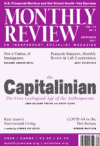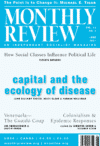Americas

In 2004, Washington launched a whole new strategy of financial war, based on the role of the U.S. dollar as the hegemonic foreign-exchange currency, to cut off the economic circulation of targeted states. The United States has created, as part of its “rules-based international order,” a coercive global framework extending U.S. financial jurisdiction to every country, economic entity, and person engaged at any point in U.S. dollar transactions anywhere in the world. | more…

“Nation of immigrants” discourse is generally used to counter xenophobic fears, but the ideology behind it also works to erase the scourge of settler colonialism, the lives of Indigenous people, and the history of enslaved Africans and their descendants. | more…

In 1970, the French left-wing filmmaker Chris Marker made a twenty-minute documentary about the French left-wing publisher François Maspero. Fleetingly, we catch a glimpse of two publications pinned side by side on one wall, seemingly granted special placement: a copy of The Black Panther newspaper and a Monthly Review. Hardly surprising is this prominence: Maspero’s relationship with Monthly Review was always fraternal, both interfaced with one another, shared lists. Together, they helped define what that New in the Left would mean. | more…

Forthcoming in June 2021
In March 2015, President Obama initiated sanctions against Venezuela, declaring a “national emergency with respect to the unusual and extraordinary threat to the national security and foreign policy of the United States posed by the situation in Venezuela.” Each year, the U.S. administration has repeated this claim. But, as Joe Emersberger and Justin Podur ague in their timely book, Extraordinary Threat, the opposite is true: It is the U.S. policy of regime change in Venezuela that constitutes an “extraordinary threat” to Venezuelans. Tens of thousands of Venezuelans continue to die because of these ever-tightening U.S. sanctions, denying people daily food, medicine, and fuel. On top of this, Venezuela has, since 2002, been subjected to repeated coup attempts by U.S.-backed forces. In Extraordinary Threat, Emersberger and Podur tell the story of six coup attempts against Venezuela. | more…

The imperialist world system, crowned by U.S. hegemony, is now threatened by China’s seemingly inexorable rise and pursuit of its own distinctive sovereign project. In this respect, the Trump administration’s prosecution of a New Cold War on China was no anomaly, but rather the inevitable U.S. response to China’s rise and the end of Washington’s unipolar moment. The Biden administration has made it clear that it not only intends to continue the New Cold War, but to accelerate it. | more…

U.S. fantasies of expansion, commercial dominion, and military prowess have long hinged on a premise of Pacific exceptionalism. Couched in the millenarian language of manifest destiny, the Pacific region and its multitudinous ecosystems, cultures, peoples, and nations have been vacated in favor of an aqua nullius that frames the region as an empty space designated for U.S. possession by divine providence. | more…

The war against fascism was transformed into the Cold War. U.S. imperialism, subdued somewhat by post-First World War isolationism, came into full flower. Washington implemented this sea change in many ways, including the division of the Korean Peninsula. | more…

One of the key components of U.S.-China strategic competition is the technology war, the essence and implications of which can be further understood in the broader context of the international division of labor and the two countries’ internal contradictions. From this front, we can decipher the antagonism between different classes/groups within and across the two countries. | more…

The Chinese diaspora is compelled either to prostrate to an edifying project of assimilation to U.S. liberal democracy, or be branded as illiberal “Red Guards” unfit for serious political discourse. This discursive context has long mobilized overseas Chinese to affirm the universalism of Western liberalism in opposition to a Chinese despotism defined either by dynastic backwardness or communist depravity. Can overseas Chinese speak for themselves in the face of the West’s “hegemonic right to knowledge?” Or will all such speech that challenges U.S. presuppositions of liberal selfhood and Chinese despotism simply be tuned out as illiberal noise? | more…

Where capitalism itself is concerned, the dominant view is that the COVID-19 crisis constitutes a rare, unpredictable, and unlikely to be repeated occurrence. The world capitalist economy, we are informed, was fundamentally sound prior to the advent of this unforeseen exogenous shock, and it will revive quickly once the SARS-CoV-2 virus is under control. This received view, however, is incorrect on all counts. | more…

How Social Class Influences Political Life
In order to understand what is happening in the United States, in the aftermath of the presidential election, one needs to comprehend the distribution of power in the country. | more…
A Sixth, Very Long Coup Attempt
U.S. sanctions killed tens of thousands of Venezuelans before the recognition of Juan Guaidó as interim president in 2019 led to even more murderous sanctions. The message is that tremendous economic pain will be inflicted on the country until Nicolás Maduro is gone. | more…










